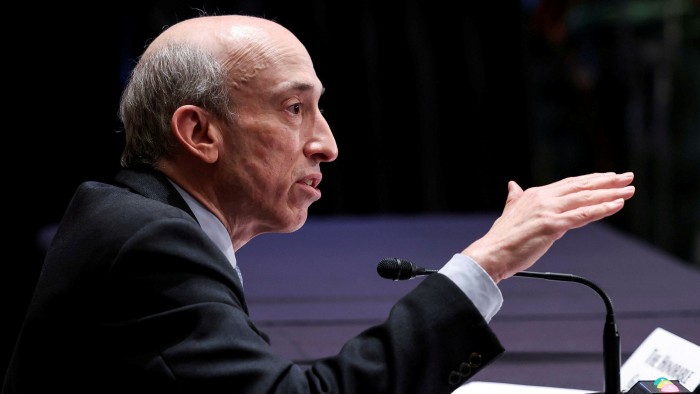US regulator warns leveraged ETPs pose systemic risk to markets

Simply sign up to the Exchange traded funds myFT Digest -- delivered directly to your inbox.
A top US regulator has warned that leveraged exchange traded products present a risk to the stability of financial markets and called for tighter rules to be applied to these complex vehicles.
Gary Gensler, chair of the Securities and Exchange Commission, said on Monday that he supported the introduction of new rules. The statement followed warnings by US regulators stretching back more than a decade about the risks to individual investors posed by leveraged ETPs.
The SEC last year forced three investment advisory firms and two broker dealers to repay a total of $3m for violations related to unsuitable sales of complex ETPs between January 2016 and April 2020.
“I believe that potential rulemaking could strengthen the investor protections around these products. [Leveraged ETPs] can pose risks even to sophisticated investors and can potentially create system-wide risks by operating in unanticipated ways when markets experience volatility or stress conditions,” said Gensler.
Leveraged exchange traded products employ derivatives to multiply the one-day performance of a benchmark, such as the S&P 500, but these bets compound when investors hold them for more than a single trading session so they can also multiply losses.
Global assets held in leveraged and inverse ETPs stood at $112bn at the end of August, up from $80.8bn at the end of 2017, according to ETFGI, a London-based consultancy. Inverse ETPs and leveraged inverse ETPs allow investors to profit if the underlying index falls.
Allison Herren Lee and Caroline Crenshaw, two of the SEC’s five commissioners, also issued a joint statement on Monday, supporting Gensler’s push for stricter rules.
They said the SEC should revive its plan to force brokers and investment advisers to carry out checks to ensure that their clients properly understood the risks before allowing retail investors to buy and sell leveraged ETPs.
The proposals to restrict sales were dropped last year following an outcry from investors who sent more than 6,000 comment letters to the SEC. All but 70 of the comment letters addressed the proposed sale restrictions.
“SEC commissioners continue to have concerns that the risks connected to leveraged ETPs are not well understood. They are likely to make it harder for self-directed investors to purchase these products. While these ETPs comprise a small slice of the market, they often attract significant interest from tactical investors,” said Todd Rosenbluth, head of ETF and mutual fund research at CFRA
US regulators have long suspected that leveraged ETFs could have a destabilising impact on financial markets, particularly in periods of stress when asset prices are falling sharply.
An academic study published last month examined the rebalancing activity of leveraged ETFs and combined this with an analysis of the behaviour of market makers that trade options to evaluate how these two channels interacted during the critical final 30 minutes of each US equity trading session between 2012 and 2020.
The study’s authors found that rebalancing by leveraged ETFs “always leads to additional momentum” — in effect amplifying the upward or downward movement of the US stock market in the final 30 minutes of trading.
Buying and selling activity by options market makers can also provide an additional boost to the momentum effects created by leveraged ETFs.
The two channels — rebalancing by leveraged ETFs and activity by options market makers — can also amplify the effect of each other if both are buying or selling at the same time.
“The effects can be significant. The regulator has to pay attention to this,” said Andrea Buraschi, a finance professor at Imperial College Business School and one of the authors of the study.

Comments